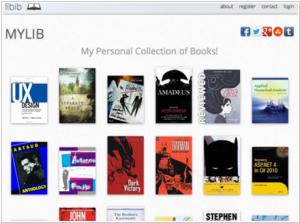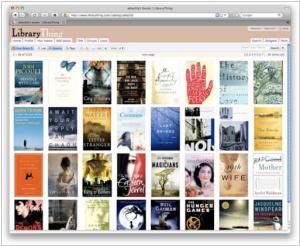Libib vs LibraryThing
Last updated: October 21, 2023
Libib and LibraryThing are both popular software tools used for cataloging and organizing personal libraries, but they have distinct differences in terms of their features, user interface, and platform compatibility.
1. Features: Libib provides a range of features for cataloging books, movies, music, and other items. It allows users to scan barcodes or enter manual data to add items to their library, and it automatically retrieves details such as title, author, and cover art. Libib offers options for customizing library categories, adding tags, and creating multiple libraries for different collections. It also supports loan tracking and integration with online databases for enhanced item information. LibraryThing, on the other hand, focuses primarily on book cataloging. It offers a robust set of features for adding books, including ISBN lookup, manual entry, and importing from various sources. LibraryThing provides advanced options for tagging, categorizing, and reviewing books. It also includes social features like connecting with other users, participating in discussion groups, and exploring recommendations based on shared interests.
2. User Interface: Libib provides a user-friendly and intuitive interface with a clean and modern design. It offers an easy-to-navigate dashboard where users can access their libraries, view item details, and manage loaned items. Libib's interface focuses on simplicity and ease of use, making it suitable for users of all levels of experience. LibraryThing, on the other hand, offers a more detailed and information-rich interface. It provides various views and sorting options for exploring cataloged books, accessing detailed book pages, and interacting with the community. LibraryThing's interface is designed to accommodate the needs of avid readers and book enthusiasts who enjoy discovering and discussing books beyond basic cataloging.
3. Platform Compatibility: Libib offers native applications for iOS and Android devices, allowing users to access and manage their libraries on the go. It also provides a web interface that can be accessed from any browser. Libib's platform compatibility makes it accessible across different devices and operating systems. LibraryThing, on the other hand, is primarily a web-based tool accessible through a browser. It provides a responsive and mobile-friendly interface, enabling users to access their libraries from various devices. LibraryThing's web-based approach offers flexibility in accessing and managing libraries but may lack the native app experience found in Libib.
1. Features: Libib provides a range of features for cataloging books, movies, music, and other items. It allows users to scan barcodes or enter manual data to add items to their library, and it automatically retrieves details such as title, author, and cover art. Libib offers options for customizing library categories, adding tags, and creating multiple libraries for different collections. It also supports loan tracking and integration with online databases for enhanced item information. LibraryThing, on the other hand, focuses primarily on book cataloging. It offers a robust set of features for adding books, including ISBN lookup, manual entry, and importing from various sources. LibraryThing provides advanced options for tagging, categorizing, and reviewing books. It also includes social features like connecting with other users, participating in discussion groups, and exploring recommendations based on shared interests.
2. User Interface: Libib provides a user-friendly and intuitive interface with a clean and modern design. It offers an easy-to-navigate dashboard where users can access their libraries, view item details, and manage loaned items. Libib's interface focuses on simplicity and ease of use, making it suitable for users of all levels of experience. LibraryThing, on the other hand, offers a more detailed and information-rich interface. It provides various views and sorting options for exploring cataloged books, accessing detailed book pages, and interacting with the community. LibraryThing's interface is designed to accommodate the needs of avid readers and book enthusiasts who enjoy discovering and discussing books beyond basic cataloging.
3. Platform Compatibility: Libib offers native applications for iOS and Android devices, allowing users to access and manage their libraries on the go. It also provides a web interface that can be accessed from any browser. Libib's platform compatibility makes it accessible across different devices and operating systems. LibraryThing, on the other hand, is primarily a web-based tool accessible through a browser. It provides a responsive and mobile-friendly interface, enabling users to access their libraries from various devices. LibraryThing's web-based approach offers flexibility in accessing and managing libraries but may lack the native app experience found in Libib.
29
Our library management app caters exclusively to home and private libraries. Our online software lets you create multiple libraries, catalog books, movies, and video games, lets you create tags, leave notes, import/export, and much more! Libib has created the best book, movie, and video game cataloging system available online!
53
LibraryThing is a cataloging and social networking site for book lovers. LibraryThing helps you create a library-quality catalog of books: books you own, books you've read, books you'd like to read, books you've lent out ... whatever grouping you'd like. Available in many languages.
Libib vs LibraryThing in our news:
2023. Libib adds Patron freeze to prevent self-checkouts/holds
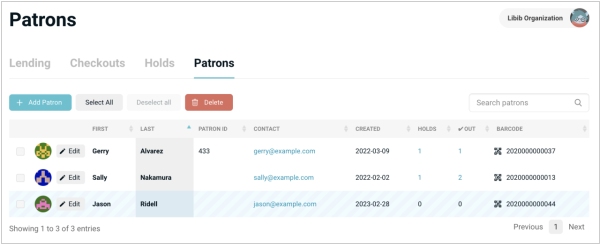
Cloud Library Management software Libib has introduced a new feature called Patron Freeze for Pro accounts. Previously, in Libib Pro accounts self-checkouts were available through the library's published platform or a kiosk. However, ensuring that patrons didn't exceed their item limits or place excessive holds relied solely on the honor system. The only way to address this issue was by deleting the patron entirely, which resulted in the removal of their patron histories and current checkouts/holds—something undesired. Now, Libib offers library managers the ability to freeze a patron's account. If a library manager chooses to freeze a patron, that patron will lose the ability to independently check out items or place holds. Instead, when they try to check out an item, they will receive a notification indicating that their account is currently frozen. To facilitate easy identification, any frozen patrons will be visually distinguished with a blue striped background when viewing the list of patrons.
2022. Online home library software Libib allows to edit individual fields fast
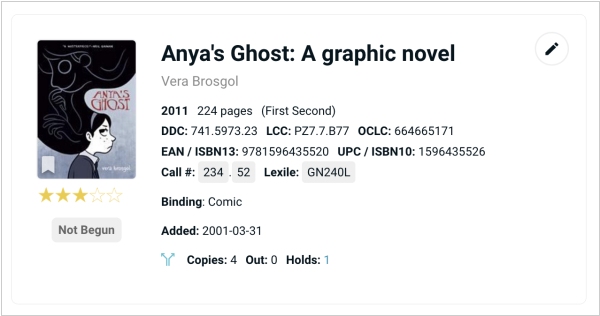
Libib has introduced a new additional way to edit individual fields on an item. Each item now displays a pencil icon which will bring up a quick edit menu. This menu is completely accessible through the keyboard; no need to use the mouse to click on anything once it’s up. Begin searching for the field name that you want to edit, and the list of options automatically reduce down to your choice. Using quick edit feature to change the title of an itemALT. Click enter on the keyboard to select the first option, or press the down-arrow key to select what you want. Your cursor is automatically placed in the input box, and you can start typing. Hit enter to save, or tab to the save button and hit enter. Once it is saved, you are brought right back to the searchable fields, where you can immediately begin editing another field. When you’re done, simply hit escape on your keyboard to close out.
2018. LibraryThing gets Alexa skill
The online book catalog service LibraryThing has recently introduced a Skill specifically designed for Amazon Echo, Dot, and other Alexa devices. With the LibraryThing Alexa Skill, you can easily add books to your LibraryThing account in a somewhat unconventional but convenient manner. Whether you're standing in the foyer with a bag of new books or perched atop a wobbly ladder in your attic filled with literary treasures, simply utter the command, "Alexa, tell LibraryThing to add [Book Title] by [author]," and Alexa will attempt to add the book to your collection. Although it may not be flawless, you can increase your success rate by bypassing the title and author and instead reading out the barcode or ISBN number from the back of the book, like this: "Alexa, tell LibraryThing to add [Barcode or ISBN number]." Additionally, there are a few other useful commands you can employ, such as asking Alexa, "How many books do I have in LibraryThing?" This way, you can impress your friends with the capabilities of your intelligent personal assistant and showcase your remarkable library.
2017. LibraryThing gets own Android app
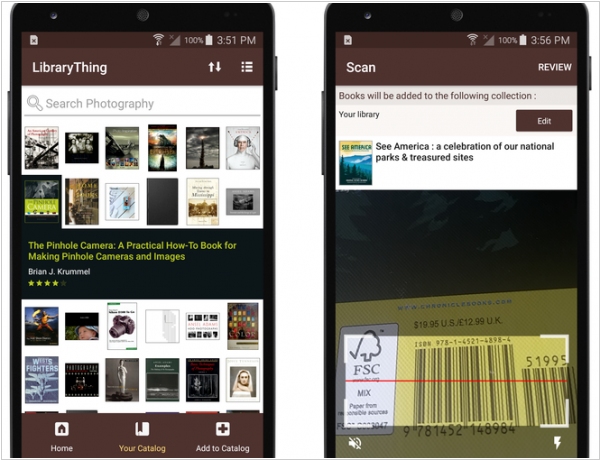
LibraryThing, the online service that facilitates personal library management, has introduced an Android app, mirroring its existing iPhone/iOS app. This new app offers a range of features, allowing users to browse and search their entire library or specific collections. Adding books, CDs, and DVDs is made easy with the efficient barcode scanning functionality, which is impressively fast. Additionally, items can be added by searching for titles, authors, ISBNs, and more. Users can browse and upload covers by utilizing the camera on their Android devices. The app also allows minor editing tasks such as organizing books into collections and rating them, while major editing can be performed through a link to LibraryThing.com. While primarily designed for phones, the app is also compatible with Android tablets. Excitingly, LibraryThing is offering lifetime memberships as giveaways to users of the app.
2016. LibraryThing allows to export your home library to excel
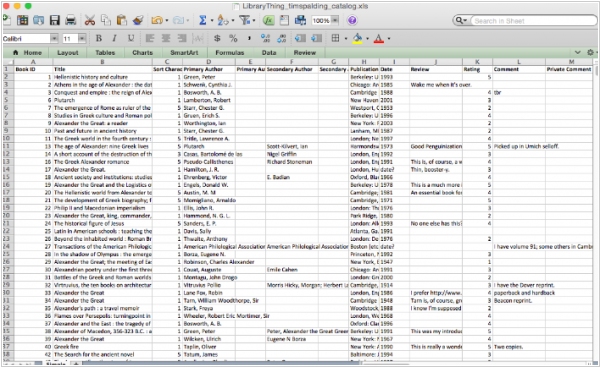
LibraryThing, an online library management tool, now offers a new feature—an "authentic" Excel export for your book catalog, replacing the previous CSV and TSV exports. The implementation is designed to be minimal and straightforward. The developers have made the headings bold, adjusted certain column widths, and specified text and numerical formats for different columns. However, the data itself remains unchanged. Although they have conducted tests, due to the multitude of Excel versions available, they would greatly value feedback from members as well.
2015. LibraryThing released iOS mobile app
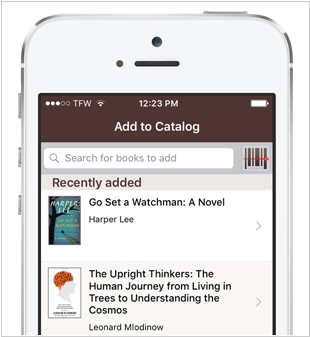
The popular online book collection management service, LibraryThing, has introduced its official iPhone app, marking its initial version with limited but essential cataloging features. With the app, users can easily browse and search their personal libraries, add books by scanning barcodes or conducting searches, upload covers by utilizing the iPhone camera, and perform minor edits like adjusting collections and ratings. As an incentive, LibraryThing is offering free lifetime memberships to individuals who use the app within the next month. To avail this offer, users must register for a new account exclusively through the LibraryThing app.
2015. LibraryThing unveiles an online tool for small libraries
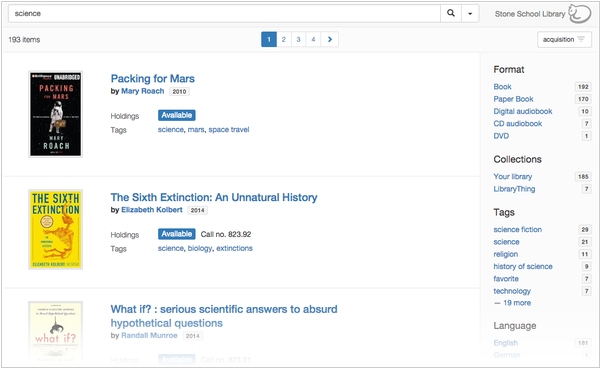
LibraryThing, the online personal library organizer, has introduced TinyCat, a robust and user-friendly online catalog designed specifically for small libraries with fewer than 20,000 titles. For nearly a decade, these modest libraries such as churches, synagogues, small schools, community centers, and academic departments have utilized LibraryThing to organize their collections, and now they can continue to do so with TinyCat. This new platform offers a cleaner interface that prioritizes helping library patrons easily locate and explore books within their library. The recent rollout of several new features by LibraryThing developers has facilitated the development of TinyCat, including Barcode Support, Circulation, Advanced Search, and the latest addition, MARC Import. TinyCat incorporates the most valuable and practical enhancements available from LibraryThing, surpassing the offerings of many larger library catalogs.
2014. LibraryThing for Libraries advises what to read next
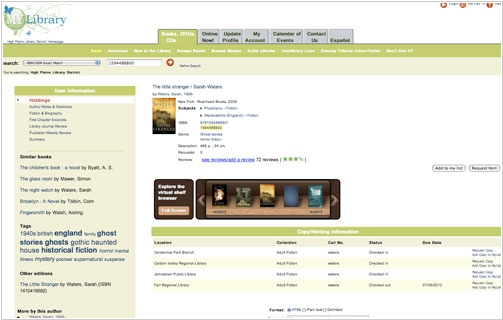
Library users will now have an enhanced experience in discovering their next read, thanks to the expansion of the Book Recommendations feature in LibraryThing for Libraries. This new upgrade, available at no additional cost to current subscribers of LibraryThing for Libraries' Catalog Enhancement Package, offers a wider range of "if you like this, then read that" recommendations. These recommendations include books by the same author, similar authors, genres, and more, all based on the library's existing collection. By leveraging the library's current holdings, this upgrade complements LibraryThing for Libraries' unique tag-based discovery and provides links to other editions and translations of books, thereby presenting users with more avenues to discover books they will truly enjoy. The recommendations in LibraryThing for Libraries are generated through a combination of input from readers, librarians, and professionals, utilizing ProQuest's Syndetic Solutions and Books In Print. This collaborative approach ensures a comprehensive and balanced service for library users.
2013. LibraryThing offers free accounts
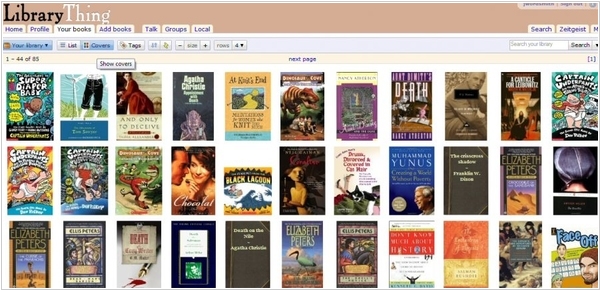
Following Amazon's acquisition of Goodreads, LibraryThing, an online book organizer known for its membership fees for adding more than 200 books, has decided to make some changes to enhance customer loyalty. To show their appreciation, LibraryThing is offering free year-long accounts to new users who sign up before the end of Sunday. After a year, users' existing book catalogs will remain intact, but a pay-what-you-want membership will be required to add more than 200 books. LibraryThing serves as an online platform that simplifies the process of cataloging books, providing users with the ability to access their catalogs from anywhere, including mobile devices. Through collective cataloging, LibraryThing also fosters connections between individuals with similar book collections, offers suggestions for future reading, and facilitates various book-related interactions.
2009. LibraryThing faces Amazon incursion
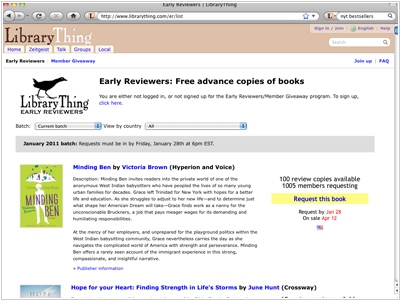
Amazon has recently imposed a requirement on online book management software, LibraryThing, instructing them to remove links to alternative booksellers such as IndieBound and Barnes & Noble from their work pages. Instead, Amazon insists on being the sole primary page link. This decision has sparked disagreement among the LibraryThing community. LibraryThing clarifies that it is not solely a social cataloging and networking platform for Amazon customers but a platform created for book enthusiasts in general. In response to this, LibraryThing is currently developing a new "Get it Now" page that will include links to various booksellers, with a focus on local bookstores and libraries, alongside several new features. The platform will reduce its primary-page links to Amazon and enhance secondary pages to provide users with improved browsing experiences. This edition-aware page will draw upon live data or feeds to ensure the functionality of the links. Additionally, these new features will allow members to access live pricing data for their owned books, further enhancing the platform's utility for users.

